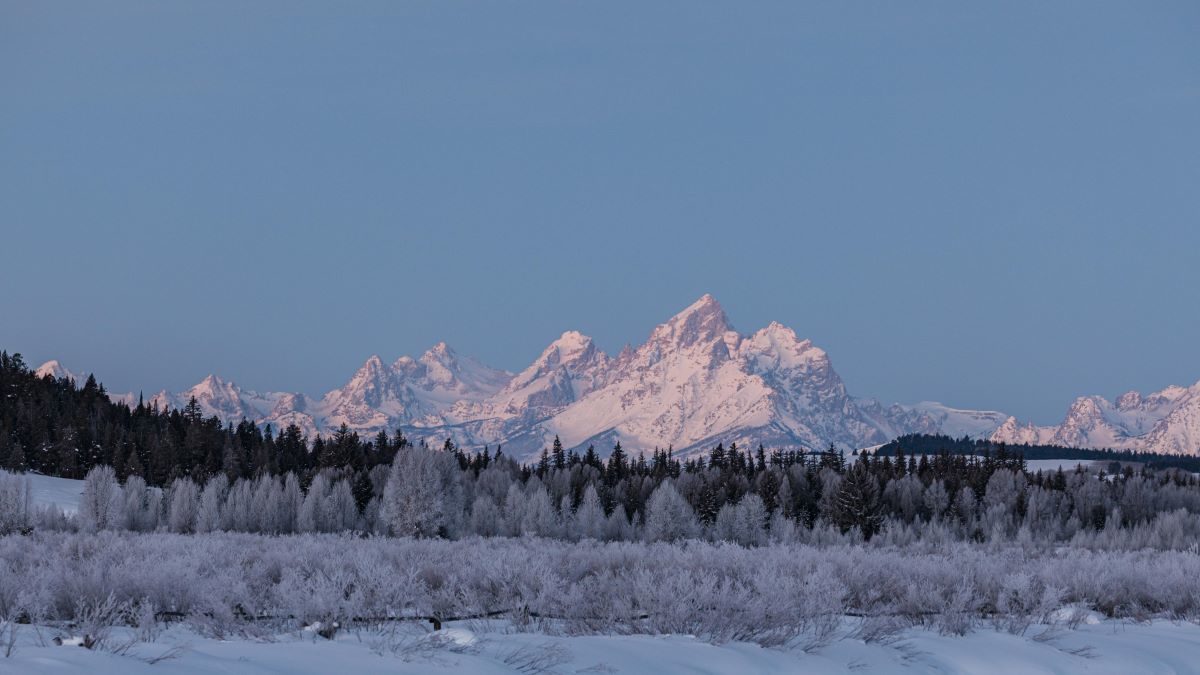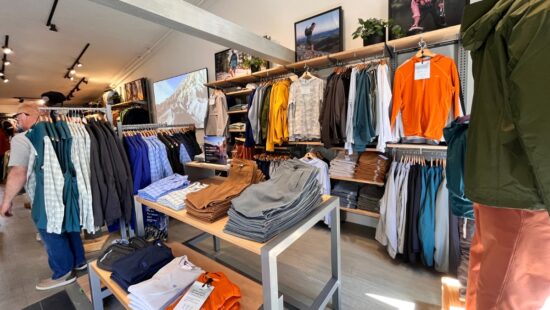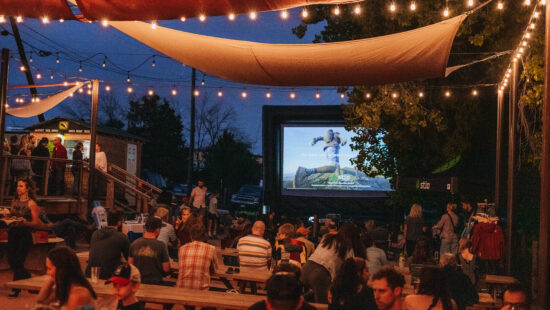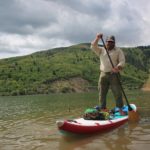Sponsored
Stewards of the Mountain Life share their tips

Stio's ambassadors are chosen not only for their athletic talents but for their alignment with company values. Photo: Stio.
EARTH — Stio’s ambassadors are chosen not only for their athletic talents but for their alignment with company values. One of the most important is stewardship of the land we love and share. Learn from ambassadors Sam Schwartz, Christy Mahon, and Tyler Ray on how to be better Stewards of the Mountain Life below.
Sam Schwartz | Jackson, Wyoming
Sam Schwartz is an entrepreneur and athlete from Jackson, Wyoming. He spent the past 10 years as a professional big mountain skier and transitioned to reusable packaging start-up founder of Avant Delivery.
Why is it important for us to be caretakers of our environment?
Personally, I have been given a professional ski career and deeply supportive community from the natural environment surrounding me in Jackson, WY. Eventually, I kept thinking, how can I give back to that? It’s important to me to be sustainable because popular destinations like The Tetons set examples for the rest of the world to see.
Stewardship Tips From Sam:
I’m a big believer in systems. If you create a habitual sustainable act, you are much more likely to make an impact than trying to fight every climate battle in sight.
1. Avoid single-use paper bags from grocery stores. They actually take up TWICE the environmental impact as single-use plastic bags because it takes much more resources to create them. Bring a reusable bag to the store.
2. Buy higher quality gear. I routinely purchase high-quality mountain apparel and wear it until the holes become glaring. Stio has done a fantastic job building durability into its products over the years.
Sustainability is a long-term game. Don’t be afraid of investing in choices that may not be perfect now but have the potential to create a self-sufficient future for us.
Christy Mahon | Aspen, Colorado
As a mountain athlete, Mahon spends most of her free time skiing, running, biking, and exploring the mountain ranges around her beautiful state. Professionally, she devotes her time to environmental science education and inspires an appreciation of the natural world through work at the Aspen Center for Environmental Studies (ACES).
Why is it important for us to be caretakers of our environment?
Sustainability is important because we don’t have anything without a healthy environment. We need to understand all of the life-sustaining benefits we receive from nature—clean air, clean water, healthy soil, pollination, and carbon sequestration. These ecosystem services are critical to our health, well-being, families, and economy —no matter who you are or where you live.
4 Stewardship Tips From Christy:
1. Consume less. We buy and use way too much stuff—excess packaging, cheap goods that don’t last, or things we don’t need. Cut out single-use plastics. Most plastic is not recycled and takes 1,000 years to break down. The clothes we wear are mostly made from fossil fuels, and 85% of this material is unable to decompose in landfills. Practice the 5 “Rs”: REFUSE, REDUCE, REUSE, REPAIR & RECYCLE
2. Reduce Your Carbon Footprint. Think about your impact and how you can tread more lightly on the planet. Think about the waste you create. Where does your trash and recycling go? Does your community have composting options? Do an energy audit of your home and figure out improvements you can make. Does your electricity provider offer renewal energy options? Can you also encourage your workplace to make these shifts at work? Get off gas—ride the bus, share rides, or ride your bike when you can. Eat primarily plants, and when you eat meat, make sure it is from sustainable sources.
3. Be politically active. Not using single-use plastic, driving EVs, and using renewable energy are important steps to being more sustainable, but those actions won’t solve the climate crisis. To really make a difference in climate, we need policy action. This means contacting your elected officials and weighing in—about the climate issue! Join climate non-profits, like Protect Our Winters or 350.org, or get involved in your local environmental center. Don’t be afraid to talk about nature and climate with friends and family – this can inspire thoughtfulness and understanding when protecting our environment.
4. Being sustainable starts with being more “ecologically conscious.” This means being more aware of your effects on the environment and everything connected to it, big or small. By being aware of our behavior, we can more clearly understand the impact of our decisions and actions. The environment is the one thing we all share. It’s the one thing we should all come together to protect.
Tyler Ray | North Conway, New Hampshire
Tyler Ray owns and operates the outdoor advocacy firm Backyard Concept in North Conway, NH, specializing in legal, consulting, management, and advocacy services focused in the outdoor recreation space. We work with businesses, outdoor organizations, non-profits, and individuals, all toward building inclusive community environments that celebrate the outdoors.
CC: Granite Backcountry, Granite Outdoor
Why is it important for us to be caretakers of our environment?
So much rides on the responsible protection of land and water, in fact, an entire industry! It wasn’t until five years ago that the Federal Bureau of Economic Analysis began quantifying the outdoor industry. Prior to that, the outdoors was something you “do” and commonly taken for granted.
Now, with impressive industry numbers, the outdoor sector is an economic powerhouse, and it is now learning how to use its collective voice. As such, the outdoor industry gives us new possibilities in how we craft economic development policies, develop rural areas (i.e., mountain towns), create new products, collaborate with public and private sectors, retain local wealth and talent to boost a local community, and ultimately care for our backyard! There’s never been a greater opportunity for private businesses to get involved and truly steward our shared land and waters. Support those companies who go the extra distance.
3 Stewardship Tips From Tyler
1. Be a Good Neighbor. User conflict is something that many wouldn’t attribute to sustainability, but getting along is critical to a functional “backyard” and community. Whether we’re sharing trailheads, trails, or summits, it’s inevitable that our resources can only support so much activity, and we end up in the same places for different reasons or purposes. But use this as an opportunity to be a good neighbor and understand another enthusiast’s perspective. In all likelihood, it’s rooted in the same spirit to get outside as your own. And encourage your local user-group organizations to work with other groups to find ways to collaborate, compromise, and ultimately, find balance in your local trails network. After all, we’re all in this together!
2. Take Others Outside; Go with Others Outside. The joy of giving isn’t just reserved for the holidays; it can be part of your every day by bringing folks into your adventures or joining others on their adventures. The key is not only keeping outdoor participation strong but also enhancing engagement with outdoor activities. This creates a more focused alliance of outdoor enthusiasts in your community which is important when issues arise, and you or other organizations need support to protect the places you play. Mobilizing a long line of hands in the air ready for action is well worth the effort.
3. Get involved. From voting to joining municipal committees to volunteering for a non-profit, getting involved is what helps drive and sustain friendly outdoor initiatives both directly and indirectly. One of the major issues we continue to face is the aging of policymakers (from local to national) who are responsible for legislation and local ordinances that reflect an older worldview and become very difficult to overcome with the passage of time. Consequently, the current issues list is long, including climate, outdoors, housing and workforce, all major examples of antiquated policies (or no policy) that we are now playing catch-up with. The problem is we’re now working with the same folks in office who introduced these policies. It’s a vicious cycle! The effort has to come from younger folks rising up who can hold a seat at the table and be involved at the core policymaking level. That could be you!


















